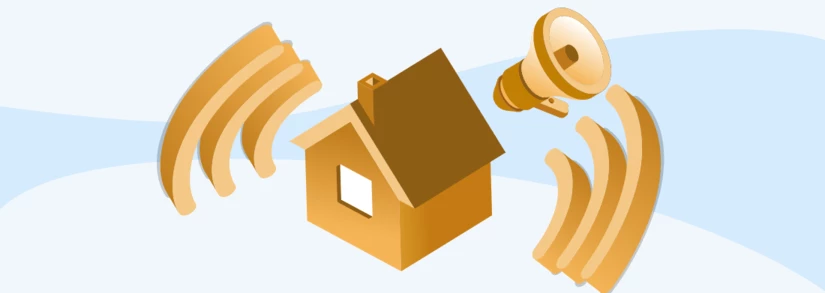
Moving home?
Sort out all your utilties!

Noise pollution in Ireland is a major factor for people when it comes to deciding where to live. If you’re looking for a quiet place to settle down, avoiding the noisy areas is likely to be a top priority, and even if you’re living in a city. In our complete noise pollution guide, we’ll walk you through how to deal with noise pollution!

Moving House? Set up All Your Utilities At Once!
Set up your energy, broadband and waste in one hassle-free call!

Need To Sort Out Your Utilities for Your Move?
We're currently closed but please leave us your number and we'll give you a free call as soon as we're open!
Although any loud music or machinery can be annoying, there are specific criteria for defining what constitutes noise pollution in Ireland. Noise pollution can be expected in a large city such as Dublin or Cork, but you’ll be glad to know you have good legal protection to make a complaint about any noise that is particularly stress inducing.
Noise pollution can come in many different varieties so it’s a good idea to understand what the noise pollution is like in a certain area. Especially if you’re moving house, it’s important to know exactly what type of noise you’re going to be dealing with and what you’re prepared to put up with. So before start packing up your belongings into moving box, you should read this guide.
Noise pollution in Ireland is defined in the Environmental Protection Agency Act 1992 which specifically lays out the type of noise which could constitute a nuisance:
“Where any noise which is so loud, so continuous, so repeated, of such duration or pitch or occurring at such times as to give reasonable cause for annoyance to a person in any premises in the neighbourhood or to a person lawfully using any public place, a local authority, the Agency or any such person December complain to the District Court…”
There are lots of different types of noise pollution in Ireland and the way to deal with them depends on their cause. There are some types of noise pollution that are just going to be a fact of life depending on where you live but there are others where you’ll be able to make a complaint.
Domestic noises can vary in where they come from and there are different rules that apply to the different types. In most instances, the Garda will deal with an issue of noise pollution if you have not managed to resolve it with the offending person verbally. Here’s a list of the different types of domestic noise pollution:
Noise pollution hours are a set of hours that define the hours in which it is illegal to make loud noises that disturb the peace. These are usually set during the night and last until the early morning, but they will often change depending on whether it’s a weekday, weekend or a holiday. These hours are often referred to as a noise curfew and set by the local authorities.
In Ireland, the noise pollution hours depend on which local area you live in. Each local authority will set its noise pollution hours so you should look up how your authority determines their own on their website.

Moving House? Set up All Your Utilities At Once!
Set up your energy, broadband and waste in one hassle-free call!

Need To Sort Out Your Utilities for Your Move?
We're currently closed but please leave us your number and we'll give you a free call as soon as we're open!
Noise pollution varies from place to place in Ireland so depending on where you’re living or planning on moving to, the levels of noise you can expect will be different. Typically, if you’re living in a big city, you’ll need to be prepared to deal with quite a bit of noise with lots of people all living together, however in the country you can expect to experience lower noise levels.
Noise pollution in Dublin is much like other capital cities. The majority of the noise you’ll experience will come from traffic and public works, or environmental noise. Occasionally, you’ll also find domestic noise from people living and renting in Dublin, but you can also find a few quiet areas in the parks and gardens in Dublin. According to Dublin City Council, these quiet areas are:
If you’re living in Cork or another urban area in Ireland, you’re likely to encounter similar situations concerning noise pollution. If you are interested in looking for a quieter place to settle down, it would be a good idea to head to the countryside!
The body that deals with the noise pollution complaint depends on the exact type of noise pollution that’s causing the problem. Depending on the nature of the complaint, you will usually need to have made contact with the offending person before you take any other steps.
| Type of Noise Pollution | Example | Who To Complain To |
|---|---|---|
| Entertainment | Restaurants, clubs, bars, pubs, concerts | Local authority or the Garda |
| Domestic | Parties, construction, alarms, dogs barking | First contact the person involved and then contact the local authority |
| Transport | Cars, road traffic, air traffic | Local authority or the Irish Aviation Authority if an air traffic related issue |
| Machinery | Construction, drills, loud fans, wind turbines | Local authority |
Source: Environmental Protection Agency
Although noise pollution from neighbours is both annoying and a crime, you should really try and sort it out with them first before making a complaint to the Garda. This is important because you also want to preserve good neighbourliness and rapport with those who live around you. However, if your neighbour repeatedly breaks the noise pollution law after talking to them, you should make a call to the Garda.
Find out more about our offers from energy, broadband and waste collection providers!
The services and products mentioned on this website may only represent a small selection of the options available to you. Selectra encourages you to carry out your own research and seek advice if necessary before making any decisions. We may receive commission from selected partner providers on sales of some products and/or services mentioned within this website. Our website is free to use, and the commission we receive does not affect our opinion or the information we provide.
Moving Home in 2026?



